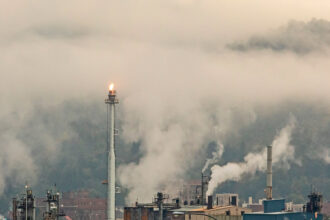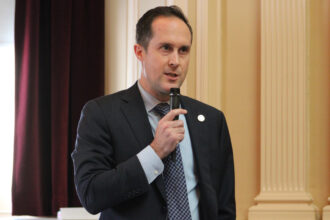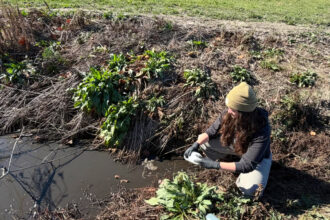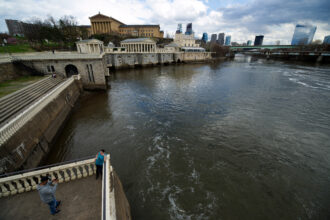Nations Quietly Reaffirm Copenhagen Climate Pledges (Deutsche-Welle)
Countries including the U.S., China and several EU member states have reaffirmed their emissions reduction goals, quietly meeting a UN deadline for the endorsement of the Copenhagen Accord.
Global Deal on Climate Change in 2010 ‘All but Impossible’ (Guardian)
A global climate treaty at the next summit in Mexico in December 2010 is impossible, according to senior figures across the world involved in the negotiations.
Brown Says UN Climate Negotiations Were ‘Flawed,’ Need Reform (Bloomberg)
UK PM Gordon Brown said the climate negotiations that failed to produce a binding climate treaty were flawed, putting pressure on the UN to change the way the talks are structured.
New Zealand to Sign Up to Copenhagen Accord (Reuters)
New Zealand will join the Copenhagen Accord, maintaining its conditional target of a reduction in emissions of 10 to 20% by 2020 from 1990 levels, the government said on Monday.
Maldives Pledges 100% Mitigation Target Under Copenhagen Accord (Xinhua)
The Maldives has pledged to go carbon neutral by 2020, cutting its net CO2 emissions by 100% under the Copenhagen Accord, the government announced.
Obama Pushes Nuclear Energy to Boost Climate Bill (AP)
Pres. Obama is endorsing nuclear energy like never before, trying to win over Republicans and moderate Democrats on climate and energy legislation.
Suppliers that Don’t Manage CO2 Could Lose Clients (Reuters)
Over half of large firms surveyed by the Carbon Disclosure Project said they would drop suppliers in the future for failing to meet criteria on managing carbon emissions.
Rudd Takes Up Fight With ‘Mad Monk’ on Australian Climate Bill (Bloomberg)
Australian PM Kevin Rudd this week will make a third attempt to introduce a carbon trading bill, confronted by new opposition leader Tony Abbott, who views the climate debate as his ticket to power.
Britain Protests Over False Melting Glacier Claims (The Independent)
Britain has officially expressed its concern to the UN IPCC about lax scientific procedures used by the body, after evidence emerged that it may have exaggerated claims about the melting of Himalayan glaciers.
Is Sun Setting on N.J. Subsidies for Solar? (Philadelphia Inquirer)
New Jersey has become one of the country’s leaders in solar energy, but renewable energy advocates fear that reductions in subsidies that spurred the growth may cast a shadow over the industry.
UK to Help Renewable Heat, Power Via Feed-In Tariff (Reuters)
The UK energy department said on Monday it would introduce the world’s first feed-in tariff for renewable heat incentives from April 2011, in addition to the feed-in tariff for small electricity generation, which would start this year.
Xstrata Plans A$6 Billion Power-Station Coal Mine in Australia (Bloomberg)
Xstrata Plc, the world’s largest exporter of power-station coal, plans to develop a $5.3 billion mining, port and rail project in Queensland as electricity demand continues to grow in Asia.
UK Must Move Beyond Carbon Cuts to Stay Competitive (Reuters)
Britain needs to focus on more than just CO2 emission cuts and manage its water, waste and food resources better to remain competitive, a report by the Aldersgate Group said on Monday.
Emissions of Potent Greenhouse Gas Increase Despite Reduction Efforts (Science Daily)
Despite a decade of efforts worldwide to curb its release into the atmosphere, NOAA and university scientists have measured increased emissions of HFC-23, a greenhouse gas that is thousands of times more potent than CO2.
About This Story
Perhaps you noticed: This story, like all the news we publish, is free to read. That’s because Inside Climate News is a 501c3 nonprofit organization. We do not charge a subscription fee, lock our news behind a paywall, or clutter our website with ads. We make our news on climate and the environment freely available to you and anyone who wants it.
That’s not all. We also share our news for free with scores of other media organizations around the country. Many of them can’t afford to do environmental journalism of their own. We’ve built bureaus from coast to coast to report local stories, collaborate with local newsrooms and co-publish articles so that this vital work is shared as widely as possible.
Two of us launched ICN in 2007. Six years later we earned a Pulitzer Prize for National Reporting, and now we run the oldest and largest dedicated climate newsroom in the nation. We tell the story in all its complexity. We hold polluters accountable. We expose environmental injustice. We debunk misinformation. We scrutinize solutions and inspire action.
Donations from readers like you fund every aspect of what we do. If you don’t already, will you support our ongoing work, our reporting on the biggest crisis facing our planet, and help us reach even more readers in more places?
Please take a moment to make a tax-deductible donation. Every one of them makes a difference.
Thank you,











